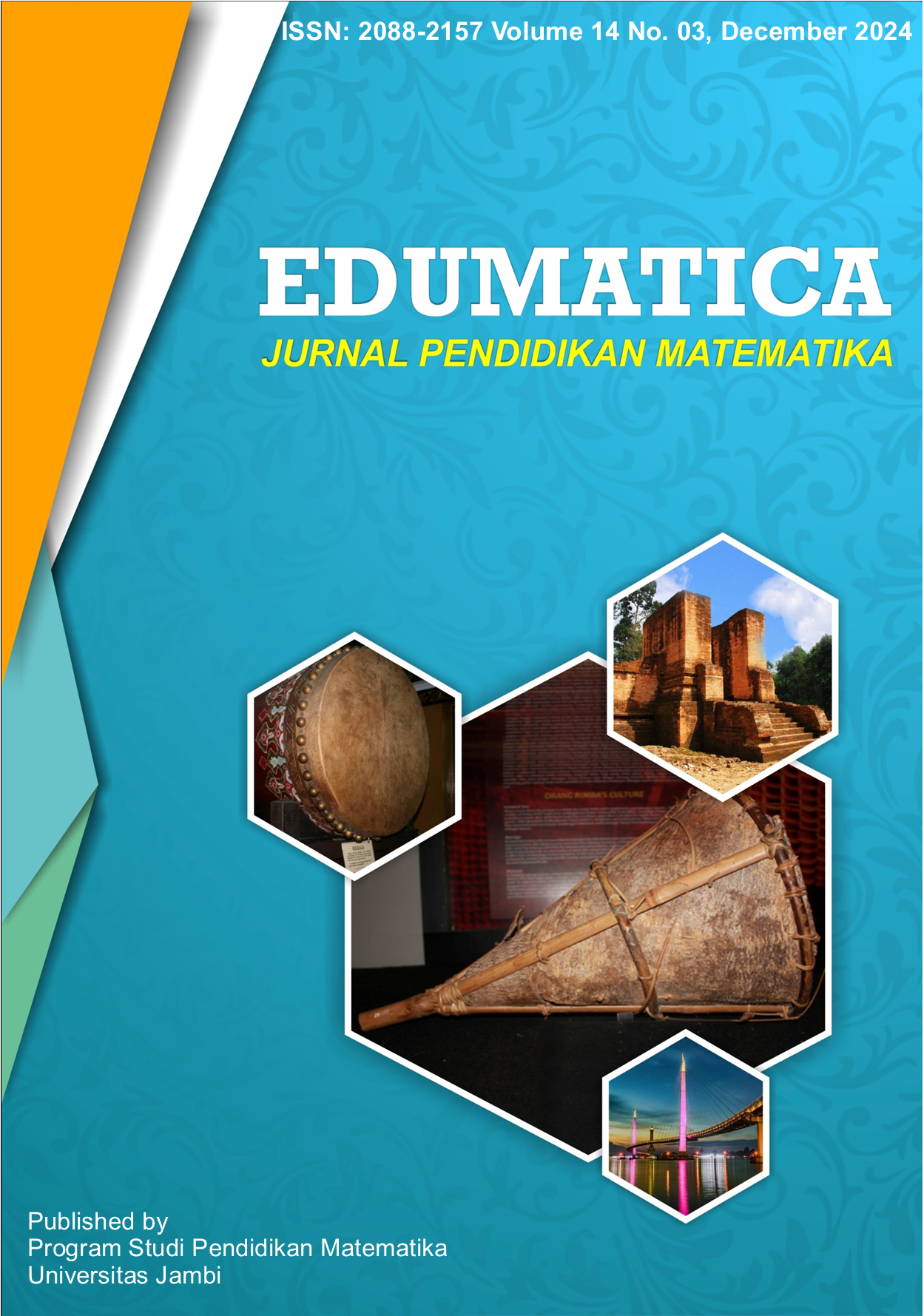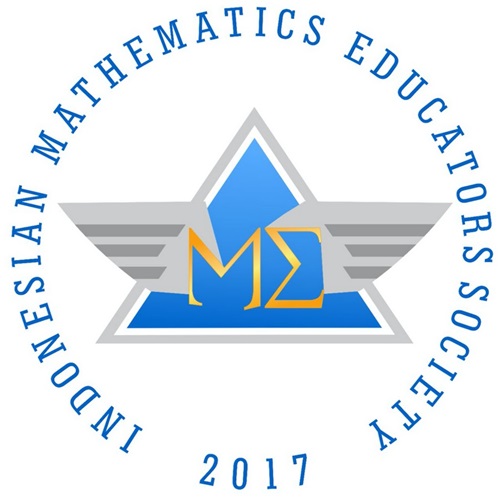Primary Students’ Comprehension Errors in Translating Math Problems
DOI:
https://doi.org/10.22437/edumatica.v14i3.38814Keywords:
comprehension errors, mathematics, primary school, problem-solvingAbstract
Comprehension is the foundation of problem-solving; without proper understanding, students will struggle to solve problems correctly. This research aims to identify specific types of mathematical comprehension errors in primary school students based on indicators from Newman's theory. By using Newman's error analysis framework, the study gives a detailed, step-by-step look at how students lose comprehension. This research was conducted using a descriptive qualitative method with three third-grade students as subjects, selected based on their level of mathematical ability (high, medium, low) determined through a diagnostic test. The results of the data analysis show that across the three student ability levels analyzed, the data revealed distinct patterns in the types of comprehension breakdowns encountered. High-performing students demonstrated minimal comprehension errors, successfully identifying key information. In contrast, mid-level students exhibited more significant issues linking the available information. The lowest-performing students showed the most fundamental misunderstandings, incorrectly identifying basic facts. These findings imply the need for a teaching approach that emphasizes contextual understanding and the development of mathematical literacy in comprehending story-based problems. Integrating evidence-based methods like problem-based learning, which have been shown to improve mathematical literacy in primary students, could help address the comprehension challenges observed in this study.
Downloads
References
Abdullah, A. H., Abidin, N. L. Z., & Ali, M. (2015). Analysis of Students’ Errors in Solving Higher Order Thinking Skills (HOTS) Problems for the Topic of Fraction. Asian Social Science, 11(21), p133. https://doi.org/10.5539/ASS.V11N21P133
Adlini, M. N., Dinda, A. H., Yulinda, S., Chotimah, O., & Merliyana, S. J. (2022). Metode Penelitian Kualitatif Studi Pustaka. Jurnal Edumaspul, 6(1), 974–980. https://doi.org/https://doi.org/10.33487/edumaspul.v6i1.3394
Ainia, C., & Amir, M. (2021). Analysis Of Elementary School Students Difficulties’ In Solving Integer Word Problems. Mapan, 9(2), 304.
Arikunto, S. (2018). Dasar-Dasar Evaluasi Pendidikan (3rd ed.). Bumi Aksara.
Bagassi, M., & Macchi, L. (2020). Creative Problem Solving as Overcoming a Misunderstanding. Frontiers in Education, 5, 538202. https://doi.org/10.3389/FEDUC.2020.538202/BIBTEX
Boonen, A. J. H., de Koning, B. B., Jolles, J., & van der Schoot, M. (2016). Word Problem Solving in Contemporary Math Education: A Plea for Reading Comprehension Skills Training. Frontiers in Psychology, 7, 155518. https://doi.org/10.3389/FPSYG.2016.00191/BIBTEX
Carvalho, R. S. (2023). Teaching Mathematics in Basic Education Through Problem Solving. Revista Gênero e Interdisciplinaridade, 4(05), 112–124. https://doi.org/10.51249/gei.v4i05.1573
Firdaus, F. M., Wahyudin, & Herman, T. (2017). Improving Primary Students’ Mathematical Literacy through Problem-Based Learning and Direct Instruction. Educational Research and Reviews, 12(4), 212–219. https://doi.org/https://doi.org/10.5897/ERR2016.3072
Fuchs, L. S., Fuchs, D., Seethaler, P. M., & Craddock, C. (2020). Improving Language Comprehension to Enhance Word-Problem Solving. Reading & Writing Quarterly, 36(2), 142–156. https://doi.org/10.1080/10573569.2019.1666760
Fuchs, L. S., Gilbert, J. K., Fuchs, D., Seethaler, P. M., & Brittany, B. L. (2018). Text Comprehension and Oral Language as Predictors of Word-Problem Solving: Insights into Word-Problem Solving as a Form of Text Comprehension. Scientific Studies of Reading, 22(2), 152–166. https://doi.org/10.1080/10888438.2017.1398259
Jonsson, B., Granberg, C., & Lithner, J. (2020). Gaining Mathematical Understanding: The Effects of Creative Mathematical Reasoning and Cognitive Proficiency. Frontiers in Psychology, 11, 574366. https://doi.org/10.3389/FPSYG.2020.574366/BIBTEX
Kusumadewi, C. A., & Retnawati, H. (2020). Identification of elementary school students’ difficulties in mathematical problem-solving. Journal of Physics: Conference Series, 1511(1), 012031. https://doi.org/10.1088/1742-6596/1511/1/012031
Lin, X. (2021). Investigating the Unique Predictors of Word-Problem Solving Using Meta-Analytic Structural Equation Modeling. Educational Psychology Review, 33(3), 1097–1124. https://doi.org/10.1007/S10648-020-09554-W/METRICS
Ling, A. N. B., & Mahmud, M. S. (2023). Challenges of teachers when teaching sentence-based mathematics problem-solving skills. Frontiers in Psychology, 13, 1074202. https://doi.org/10.3389/FPSYG.2022.1074202/BIBTEX
Mulyati, Y., Damaianti, V. S., & Hadianto, D. (2017). Reading Comprehension - Ability to Understand Text Mathematics to Solve Basic Mathematical Questions. SCITEPRESS - Science and Technology Publications. https://doi.org/10.5220/0007169104540458
Nahdi, D. S., Cahyaningsih, U., Jatisunda, M. G., & Rasyid, A. (2024). Mathematics Interest and Reading Comprehension as Correlates of Elementary Students’ Mathematics Problem-Solving Skills. Edukasiana: Jurnal Inovasi Pendidikan, 3(1), 115–127. https://doi.org/10.56916/EJIP.V3I1.510
Nuraini, N. L. S., Cholifah, P. S., & Laksono, W. C. (2018). Mathematics Errors in Elementary School: A Meta-Synthesis Study. 148–151. https://doi.org/10.2991/ECPE-18.2018.32
Nurharyanto, D. W., & Retnawati, H. (2020). The difficulties of the elementary school students in solving the mathematical narrative test items. Jurnal Prima Edukasia, 8(1), 29–39. https://doi.org/10.21831/JPE.V8I1.29969
Paut, L. E., Kartono, & Marwoto, P. (2023). Analysis of Student’s Error in Solving Multiplication Operations in Terms of Mathematical Concept Understanding. International Journal of Research and Review, 10(3), 397–403. https://doi.org/10.52403/ijrr.20230347
Prediger, S., Wilhelm, N., Büchter, A., Gürsoy, E., & Benholz, C. (2018). Language Proficiency and Mathematics Achievement: Empirical study of language-induced obstacles in a high stakes test, the central exam ZP10. Journal Fur Mathematik-Didaktik, 39(1), 1–26. https://doi.org/10.1007/S13138-018-0126-3/METRICS
Rachmawati, L. N., Cholily, Y. M., & Zukhrufurrohmah. (2021). Mathematics Communication Mistakes in Solving HOTS Problems. Infinity Journal, 10(1), 69–80. https://doi.org/10.22460/INFINITY.V10I1.P69-80
Rahman, M. Md. (2019). 21st Century Skill “Problem Solving”: Defining the Concept. Asian Journal of Interdisciplinary Research, 64–74. https://doi.org/10.34256/AJIR1917
Sani, D. N., & Rosnawati, R. (2022). Students’ Error Analysis in Solving Probability Story Questions Based on Revised Newman Theorem. Jurnal Pendidikan Matematika (JUPITEK), 5(2), 123–131. https://doi.org/10.30598/JUPITEKVOL5ISS2PP123-131
Setiyawati, E., Fauziati, E., Darsinah, Minsih, & Prastiwi, Y. (2022). Analysis Problem-Solving Errors in Mathematics Story Questions. JPI (Jurnal Pendidikan Indonesia), 11(3), 466–479. https://doi.org/10.23887/JPIUNDIKSHA.V11I3.46980
Sumartini, T. S., & Safitri, L. (2022). Analisis Kesalahan Siswa SMP dalam Menyelesaikan Soal Cerita Sistem Persamaan Linear Dua Variabel Berdasarkan Prosedur Newman. Prisma, 11(2), 302–309. https://doi.org/https://doi.org/10.35194/jp.v11i2.2193
White, A. L. (2010). Numeracy, Literacy, and Newman’s Error Analysis. Journal of Science and Mathematics Education in Southeast Asia, 33(2), 129–148.
Downloads
Published
How to Cite
Issue
Section
License
Copyright (c) 2024 Davina Aurelia, Ratna Ekawati, Slamet Arifin

This work is licensed under a Creative Commons Attribution-NonCommercial-ShareAlike 4.0 International License.







